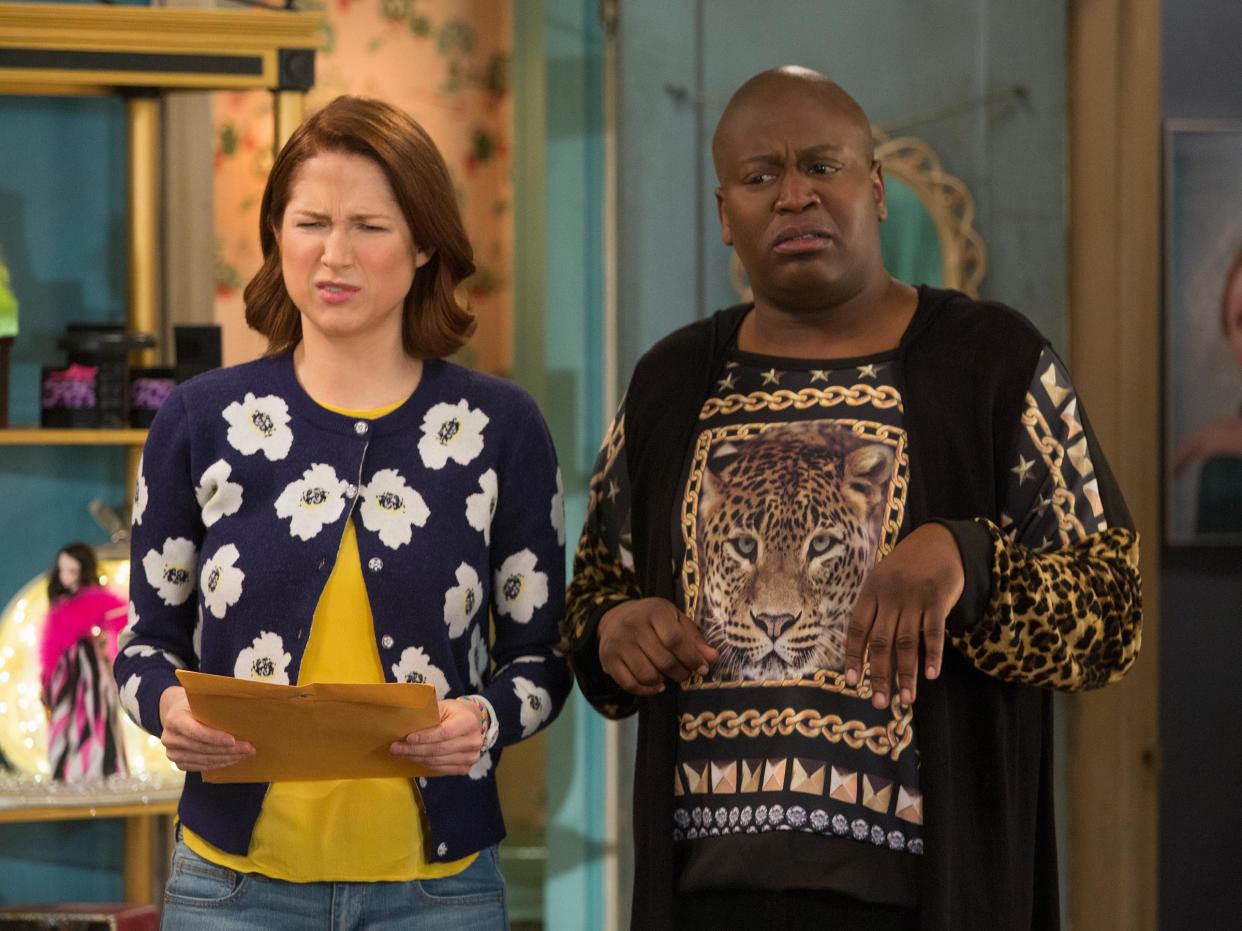Unbreakable Kimmy Schmidt season 3: EW Review

In these meta-mad times, few shows talk back to the world with greater hilarity and provocation than Unbreakable Kimmy Schmidt. The new season of the satirical fantasia starring Ellie Kemper as a candy colored “cartoon person” trying to stay sweet while getting real in a mad, demeaning world is no exception. The storytelling gobbles up hot topic politics, entertainment, and social issues like candy and burps them up as laughing gas with sweet-and-sour sting that make you laugh or wince or both. Creators Tina Fey and Robert Carlock mock, among many things, the romantic notion that our culture can teach, improve, and refine us, even as they pine for it. One typically complex, that’s-so-wrong bit finds Titus Andromedon (Tituss Burgess), still desperate for stardom (and flailing for a paying job), auditioning for Sesame Street on HBO – and tempted to self-debasement on the casting couch of a puppet named Mr. Frumpus. Somewhere, Mr. Rogers weeps.
Kimmy is coming off a next-level year. Fey and Carlock pushed their irreverent and reflexive comedy to the max, creating episodes that played by like super-brainy live-action Mad strips, musical with speed banter and crammed with sight gags. Swerving into binge dynamics, they crafted a season-long saga built around a mystery of Kimmy’s foul, involuntary belching (“It’s like a mouse died inside the walls of your body!”) that culminated in a bravura payoff, gonzo ironic and deeply sincere all at once. The stories offset some combative defensiveness, like its want for nothing’s-sacred outrageousness, by internalizing some criticisms and deepening its characters. The controversial Jacqueline White — a race-erased, white-washed Sioux played by Jane Krakowski – pursued self-redemption before getting woke and humbled. Titus was forced to confront the skeletons in his closet (and clean out his closet; begone, Air Jordasche thigh-highs!) and matured via lovely romance with coming-out construction worker Mikey (Mike Carlsen). And trauma survivor Kimmy got over those burps with some help from a real-talk alcoholic therapist (played by Fey), examining her complex cheeriness and penchant for happy-place escapism. Season 2, with its tweaked MO and tales of deconstruction, was all about the importance of being breakable.
RELATED: Unbreakable Kimmy Schmidt: Before They Were Stars
Season 3 finds Kimmy and company messily chasing reconstruction, producing satire that questions the politics of change and personal responsibility. Episode 2 coyly spoofs our recent election by having cracked, impolitic Lillian (Carol Kane) run a Trumpish campaign for city council, subverting Jacqueline’s crusade to clean up a toxic environment. Kimmy is given a fascinating moral conundrum: granting her former captor-rapist Reverend Richard Wayne Gary Wayne (Jon Hamm) a divorce. Agree, and she can finally break with her painful past. Deny him, and she saves his latest target (Laura Dern) from wrecking her future. As she wavers between doing right by herself and doing right for others, Kimmy goes to college, forcing her to take further stock of herself and find a calling. Horse brusher? Crossing guard? Maybe something a little better? A possible romance with a philosophy student (Daveed Diggs) allows the show to explicitly interrogate two of its essential themes: What’s real and what’s good. Kimmy keeps her optimism while wearing the wisdom she gained in season 2, but there’s still much she needs to reconcile inside herself. Kemper, as always, is terrific (the whole cast is), and more than ever, she captures your imagination for a series-long arc of character growth.
Meanwhile, Titus parts (permanently?) with Mikey for reasons that may or may not be best for either of them. The agonies of Titus are good for some lavish parodies of Beyoncé’s “Lemonade,” but they’re also somewhat familiar. His plight embodies the season’s sluggish start. The first two seasons began with long wind-ups, too, but this year, the writing, like the characters, seems uncertain about how to advance some key characters, relationships, and subplots. Episodes 5 and 6 finally catch fire by playing with it. Josh Charles as slimy scion of the Washington Redskins empire is a great baddie who helps to ignite a storyline about Jacqueline’s mission to rename the team. Kimmy’s college experience allows the show to vigorously satirize issues of gender, sex, and those damn millennials and their easily triggerable political correctness. It’s contentious, for sure, but the show sparks when it touches charged rails, and there’s always a counter-balance of argument or grace waiting, if not right away, then downstream. The story of Kimmy Schmidt’s continuing education was bound to get bumpy, but it remains entertaining, and season 3 has every chance to graduate with honors. B

